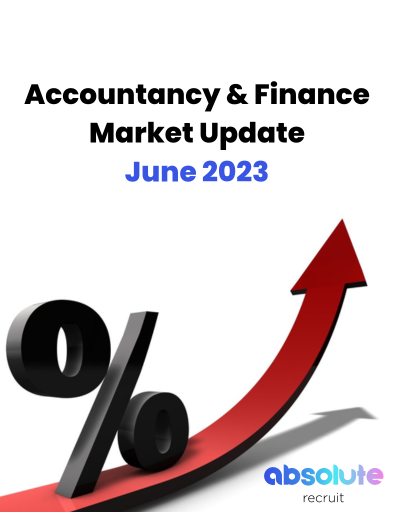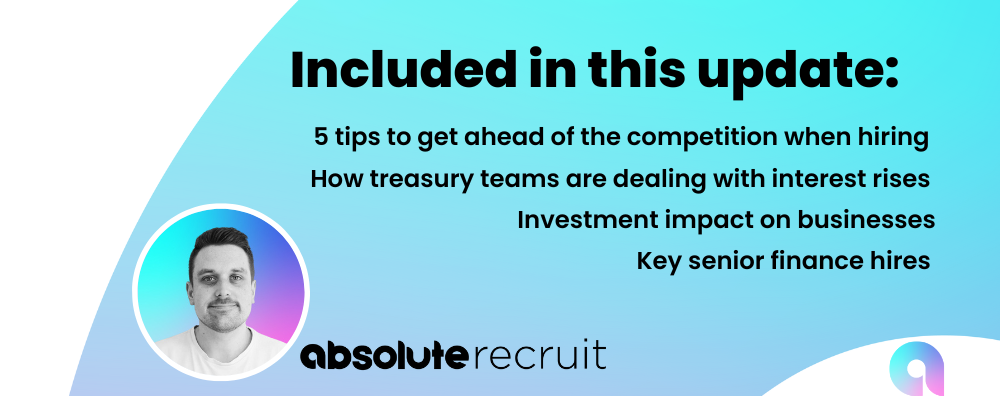




Welcome to June’s update 👋 Before I get started… I wanted to say it was such a pleasure for Absolute to host our first CFO meet-up, an informal evening where like-minded FD’s and CFO’s networked, shared experiences, struggles and a story or two! The feedback has been so positive that the next one is pencilled in for September! If you didn’t attend in June but would like an invite to September’s meet-up, please let me know!

Here is a photo from the meet-up 😊

The 2023 landscape looks starkly different from the post-pandemic boom of 2020-2021. Venture Capital Investment is down 80% in Q1 2023 (£2.9b) compared to Q1 2022 (£12.3b). Many of the start-up CEOs and CFO’s I’ve spoken with recently have talked about the struggles they are having with fundraising. Competition is fierce and investors are being extra diligent and opting for revenue generating businesses with more traction. The impact has not been limited to smaller start-ups either; larger VC-backed businesses have been massively impacted as the financial taps are turned off, these cash-burning businesses have needed to cut costs, and usually redundancies are the quickest way for a business to do exactly that. Many finance processionals were hired to lead exciting projects, IPO’s, M&A, expansion into new overseas markets, but these projects have now been paused, and the focus has shifted to less attractive tasks like cost-cutting, which when talking about redundancies can affect morale.
These next 12 months will be about navigating the cost challenges for businesses and maximising efficiency where possible. Here are the two key areas I see companies hiring…
The more visibility a business has and the quicker access it has to that key information, the faster the business can make key decisions. Commercial finance and data teams working closely together will be key for 2023 and I see this as a key area for finance teams to invest and hire throughout the year.
Companies looking to make efficiencies are going to need skilled finance support to lead on projects like restructuring teams, consolidating entities, closing business units, implementing new systems and streamlining processes. Given the current market and need for such skills, I don’t see the current demand for transformation specialists to slow down any time soon.
For candidates contemplating whether now is a good time or not to start looking, I would say yes very much so. Despite a slowdown in hiring for a lot of sectors, good accountants and finance professionals are needed more than ever and are still proving hard to come by. Current sectors that seem to be performing better and are worth considering are B2B SaaS, ESG and AI.

Not every business can afford a dedicated treasury function, often in smaller businesses this role is taken on by the Financial Controller. But over this year, we are seeing a trend in companies investing into their treasury functions (even smaller businesses). Companies are looking to capitalise on the interest rate increases and make the most from their cash deposits. Not something many businesses focussed on over the last 15 years with interest rates at historical lows (0.1%), but with the base rate at almost 5%, companies are now seeing this as a worthwhile investment.
A recent example of this, was a London tech client of ours (c.£100m revenue) with global operations – The business has 400 employees, with 15 in finance but no dedicated person for treasury (duties split between the Finance Director and others in the team). They understood the value that could be added through forecasting for cash deposits and looking into the best places to keep their cash from an interest income perspective, but this wasn’t something they had time to do. We discussed a number of options with them that could help them meet their needs with some flexibility, such as part-time and interim solutions, before finally concluding a permanent search would be most appropriate given a number of projects in the pipeline for the business.
After a thorough search process, we shortlisted 4 candidates for the client to meet, resulting in an offer within 3 weeks of our initial conversation. The Treasury role is one that can very quickly impact the bottom line, and actually pay for itself. Our client typically will hold several million at any one time and they projected this role would pay for itself within the first 6 months and would take ownership of cash forecasting and FX trades/payments from the Finance Director freeing up their valuable time.
If you feel you could benefit from a dedicated treasury professional in the business, whether permanent, interim or part-time please do get in contact with me for advice.

In a downward economy and hiring market, the perception can often be that it is easy to secure a candidate. For some this may be true, but hiring in finance and accounting is still challenging and very competitive. I often hear about the good, the bad and the ugly when it comes to hiring and have heard plenty of success and horror stories and wanted to share my top 5 tips, which can be quickly implemented to your hiring strategy and will greatly improve your hiring success.
One of the biggest mistakes I see companies make when posting finance vacancies is failing to advertise a salary range. This oversight often results in qualified candidates being deterred from applying after realising their time has been wasted pursuing positions that offer significantly lower pay than their expectations. Putting a salary range on a job description will not only increase the number of applications, but more importantly, save you time in speaking to candidates with expectations outside of this range. Correctly benchmarking the salary is equally as important, there is little point in advertising an unrealistically low salary that hasn’t been properly benchmarked. I recently spoke with an HR Manager who had been struggling to find a suitable newly qualified financial accountant for six weeks, it turns out they had benchmarked the salary based on a previous hire back in 2020. Although there are benchmarking tools online, my advice would be to speak with an experienced recruiter who can give you an up-to-date and accurate salary range and a realistic outlook on the current market.
A common obstacle to successful finance hires is a slow or needlessly lengthy interview process. Does a candidate truly need to meet five people during the process? If multiple interviews are necessary, consider combining two interviewers in a single meeting. In most cases, two stages are more than enough for assessing candidates, even for senior-level positions. While video interviews are excellent for initial screenings, it is crucial to have at least one face-to-face meeting in the office to properly assess cultural fit and increase the likelihood of candidates accepting job offers. Please also consider keeping the time between interviews to a minimum (a few days is ideal, as candidates can quickly lose interest or accept other offers beyond a week).
Many companies fail during the interview process by neglecting to effectively sell the role to candidates. This is a common complaint I often hear. Companies become overly focused on asking questions to evaluate candidates, while forgetting to highlight the benefits and opportunities associated with the role. I was recently speaking with a Head of Finance who told me about a particular horror story about a company they recently interviewed at, where they had been grilled for 60 minutes about their technical knowledge and experience with no time left for questions and the candidate leaving without a good understanding of the role and business. Although the company seemed interested, the same could not be said from the candidate. Make the interview a two-way street, during an interview you and the candidate will both be assessing the fit. Every candidate should receive a detailed explanation of the position, including information about career progression, development prospects, team and company culture, and the plans for the business for the next few years.
When searching for a new role, candidates typically seek opportunities to leverage their previous experience while also learning and developing. A good rule of thumb is to aim for a 75/25 split, where the candidate possesses the necessary experience and skills to handle 75% of the duties, while having room to grow and learn the remaining 25%. While it is possible to hire someone who can perform 100% of the role, it often comes at a higher cost and may not result in long-term retention; so you’ll need to prioritise what is most important immediate skillset over longevity.
A common mistake companies make when engaging recruitment agencies for support is working with multiple agencies simultaneously for the same role. The perception is more agencies equals larger area covered and a faster process. Based on our experience, this approach leads to a poor quality of service, and we strongly advise against it. A CFO recently shared a story of a time, where he was contacted by four different recruitment agencies about the same role within 48 hours which he found off-putting to say the least! When buying a house, if you saw the same house advertised by 4 different estate agents would you start to question why? Is there something wrong with it? Multiple agencies racing to send candidates quickly often results in excessive and low-quality CVs, hiring managers spending more time on interviews, and ultimately, unsuccessful hires. Instead, it is recommended to provide one agency with an exclusive period of 2-3 weeks, enabling them to dedicate their time and resources to sourcing a high-quality shortlist of candidates to meet your requirements.
Thank you for taking the time to read our senior finance market update. As always, if you would like any advice on hiring, candidates, salary benchmarking or a general chat about the market or to discuss your next role; you can now book a 30-minute call with me using this link – https://calendly.com/ashley-absolute-recruit/30min
